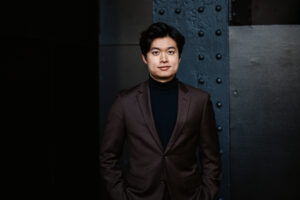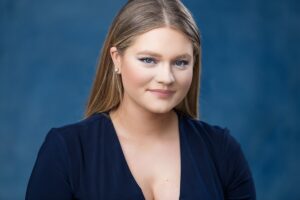

Upstate New York is a beautiful place! The photo above and the two seen here were taken just a few days apart. The one above is Cooperstown’s Main Street during the holiday season, one is our beautiful theater sitting atop the lake on my drive to work, and the last is the view from the back door of my house. Despite the occasional challenges winter poses here (my old car has been forcibly retired in favor of something more location-appropriate), each season is as breathtaking in its own way as the summer we all look forward to.
As winter gives way to spring, each month between now and the beginning of rehearsals, I want to give you a window into what excites me about the pieces, productions, and artists coming to The Glimmerglass Festival this season. It is full of some of my favorite works, each one containing some of theater’s most goosebump-inducing moments. Together, our productions span the entire history of opera – but let’s start somewhere in the middle with a brand-new production featuring a thrilling cast: Glimmerglass’s first staging of Romeo and Juliet.
Pour yourself a cup of tea or a glass of wine, put on your headphones or connect that bluetooth speaker, and join me to learn more about this moving masterwork – then call all your friends to let them know that single tickets go on sale at the end of the month (January 23 – July shows / January 30 – All)!
The Composer – Charles gounod

This is the face we associate with Charles Gounod, the composer of Romeo and Juliet – devout, refined, paternal. While his fame now rests on a small number of works, he unearthed a new vein of raw emotion in French music, inspiring generations of compatriots to come. Massenet, Bizet, Fauré, Debussy – so many great composers were shaped by his teaching and example.
I spent the first part of my career as a church musician and organist before finding my way to the theater. Gounod’s path (considerably more pious than mine…) was similar, and his music seems to have this great tension between the sacred and profane. He often seems unable to decide which is which: his liturgical music is sometimes so dramatic and theatrical it borders on sacrilegious; his operas are often so lush they seem to come with their own halo. Sublime, cantankerous, catchy, radiant, sanctimonious, devilish – his music can be all of these.
You already know some of his music. Listen to his Funeral March of a Marionette for a minute or so – perfect music for a great man of the theater (it was the theme tune to the TV show Alfred Hitchcock Presents). Next, listen to the divine Leontyne Price singing his Ave Maria – a masterful reworking of a Bach prelude. Then, give the Faust ballet music a try – I personally love the recording conducted by Sir Thomas Beecham. Ringing any bells?
THe Play – Shakespeare’s “Most Excellent Tragedy”
Few works of literature have been as influential as William Shakespeare’s “most excellent tragedy,” Romeo and Juliet. Written at the end of the sixteenth century, it reads as fresh today as it did four and a quarter centuries ago. Lines like this still take my breath away:
my bounty is as boundless as the sea, my love as deep.
The more I give to thee, The more I have, for both are infinite.
But “what’s in a name?” (another quote from the play…) Why has this become the quintessential depiction of “star-crossed lovers”?
It’s the perfect tragedy – pure love-at-first-sight senselessly doomed by a deadly family rivalry. We are told at the very beginning of both the play and the opera what is about to transpire, yet we are helplessly bound together with the protagonists, fighting against fate as the drama unfolds. There are many reasons why Romeo and Juliet is a great play, but in technical terms, the chiaroscuro (contrast between light and shade) is ideal – the overwhelming sweetness of young love balanced by the excruciating agony of their destinies.
|
|
|
Countless adaptations and reworkings of the play exist in popular culture. Glimmerglass staged one recently – the great American musical West Side Story, which translates the action to New York City’s Upper West Side in the mid-50s. Director Steven Spielberg remade the original Oscar-winning 1961 movie musical in 2021, winning several more awards of his own in the process. Baz Luhrmann’s beautiful 1996 updating helped catapult Leonardo DiCaprio to international fame – who can hear Des’ree’s rendition of Kissing You without remembering the fish-tank scene?
The Music – Glorious & Inspiring
There are references and homages to Romeo and Juliet throughout contemporary music: Rihanna’s We Found Love, Taylor Swift’s Love Story, and Dire Straits’ Romeo and Juliet come to mind among many others. (As a side note, Dire Straits’ front man Mark Knopfler grew up in North-East England, very close to my hometown. On occasion, he could be found strumming his guitar in the snug of my parents’ local pub on Irish music night…)
There are some glorious musical moments to look forward to throughout the piece:
The soprano’s first aria, “Je veux vivre” – a perfect expression of that amazing feeling of freedom and possibility we have as a teenager at a great party – was added for the first Juliet, Adelina Patti. It is much different to the rest of the role, lighter and higher, exploiting that singer’s particular abilities. Kathleen Battle is radiant in the aria. Listen next to the “La stupenda,” Dame Joan Sutherland, who even sings it in the rarely performed “French key,” a tone higher than usual.
That “French key”, a half-step higher than the original, exists also for the tenor’s great aria, sung as he waits outside Juliet’s balcony – “Ah, lève-toi, soleil!” The magnificent Swedish tenor Nicolai Gedda sings it with all his usual elegance and style.
Later in the opera comes Juliet’s so-called “Potion” or “Poison” aria, “Amour, ranime mon courage.” Enjoy this lovely clip of Ailyn Pérez singing it at the Met (Ailyn recently became engaged to Glimmerglass favorite Soloman Howard, who proposed on stage during a performance of the San Francisco Opera).
It is the four great duets for the lovers which are the beating heart of the piece. I find it hard to beat Jussi Björling and Bidu Sayão in a live 1947 recording from the Met, although Mirella Freni and Franco Corelli’s 1968 recording gives them a run for their money, especially in that finale. What it must have been like to hear them live!
Yet one of the most memorable moments for me, especially as a past chorus-master, is the great outpouring of grief from both Romeo and the crowd after the deaths of Mercutio and Tybalt. For me, you cannot beat the thrill of the outstanding American tenor Neil Shicoff at this moment – note those wide leaps, just like the composer’s setting of “Ave Maria,” which make this such an iconic melody. For me, it is one of the finest moments in opera.
The Production – Timeless with a modern edge
Our new production of Romeo and Juliet is sponsored by Elizabeth M. and Jean-Marie R. Eveillard and Jacqueline B. Mars. We are so grateful for their generous support! It will be directed by Simon Godwin, the Artistic Director of the Shakespeare Theatre Company in Washington, D.C. It turns out that Simon and I were contemporaries at the same college during university, although we didn’t know each other personally back then. Small world!
Romeo and Juliet is a co-production with Washington National Opera, where it will travel after premiering at Glimmerglass this summer. As such, it needs to work for both stages. To start that work we gathered the production teams from both companies before the holidays at wig designer Tom Watson’s studio in New York City to discuss the design. This is a crucial step in any production, where the whole team gets to walk through every detail of the sets, costumes, and director’s vision before anything is even built.
|
|
|
|

Our production leaves the action in Verona, giving the piece a timeless interpretation with a modern edge. The Capulet ball, which opens the action, (seen above as Juliet sings her waltz “Je veux vivre” like a bird in a cage) has a circus theme to it in our director’s mind. This has been realized with incredible color, energy, variety, and fierce imagination by our costume designer Loren Shaw. That’s a party I want to be at!
|
|
|
|
The opera relies on its two leads, who carry the drama through a series of exquisite duets. These are tricky roles, as the characters depicted are teenagers (Juliet is 13 in the original story!), but the vocal writing requires plenty of lyricism and stamina. In productions of the past, this has led to some singers taking on these roles well into later life – tenor Alfredo Kraus was still singing Romeo in his 60s!


We are very lucky to have two thrilling young talents making their Glimmerglass debuts this summer in the lead roles. Our Romeo, tenor Duke Kim worked with me as a young artist in Washington, going on to win the Metropolitan Opera’s Laffont Competition and take second place in the international Operalia Competition. He is joined by Magdalena Kuźma in the role of Juliet, currently a Lindemann Resident Artist at the Metropolitan Opera and a past winner of the ACPC Marcella Sembrich and Pasadena Opera Vocal Competitions. Watch Duke and Magda in the Operalia and Pasadena finals to get a sense of their magnificent talents.
They are joined by several Glimmerglass favorites and alums, including the incredible Stefano de Peppo as Count Capulet, Meredith Arwady as the nurse Gertrude, and Sergio Martinez as Friar Laurent. The fabulous mezzo Lisa Marie Rogali, a favorite in recent seasons, takes on Stephano, Romeo’s sidekick. We think punk will suit her just fine!
|
|
|
|
|
|
|
|
A Show Not to Miss

There are so many great reasons not to miss the Glimmerglass production of Romeo and Juliet:
- A Glimmerglass premiere, and a rare chance to see it performed live in Central New York.
- A thrilling cast full of stars-on-the-rise – you’ll be able to say, “I knew them when…”!
- A great Shakespeare director’s first foray into opera, in a vibrant new production.
- Gorgeous, opulent music, led by our fabulous Music Director, Maestro Joseph Colaneri.
- During the month of August, you can enhance your experience of the piece by catching a production of Shakespeare’s play for free at the Theater at Woodshill, less than an hour away in Sauquoit.

Micah (my wildly patient husband) and I are so happy to be living here in beautiful Cooperstown. We have a fabulous summer ahead. There is so much to see, experience, and enjoy at the Festival and in the area – more than enough to fill a long weekend. Single tickets go on sale at the end of this month – make sure you get the seats and lodgings you want!
THE FESTIVAL IS COMING – ARE YOU READY?!?
Psst…did you know ticket sales only cover 35% of our operating costs? Consider making a gift to Glimmerglass or adding a contribution to your ticket total.
















This blog has so much in it…feel like I’ve been given a free course! Thank you so much!
Looking forward to summer in beautiful Cooperstown and seeing this production.
Oh Rob….if only you and I had spoken of Dire Straights in our radio interview….!
Beautifully written and with an air of whimsy which I loved!
Pamela
You have inspired excitement, anew in me for this production! We take this wonderful story for granted because we know it well, but every production brings new feelings in our souls. Agree with previous comment that we all learned so much from your writings- like a master class! So glad you are here!!